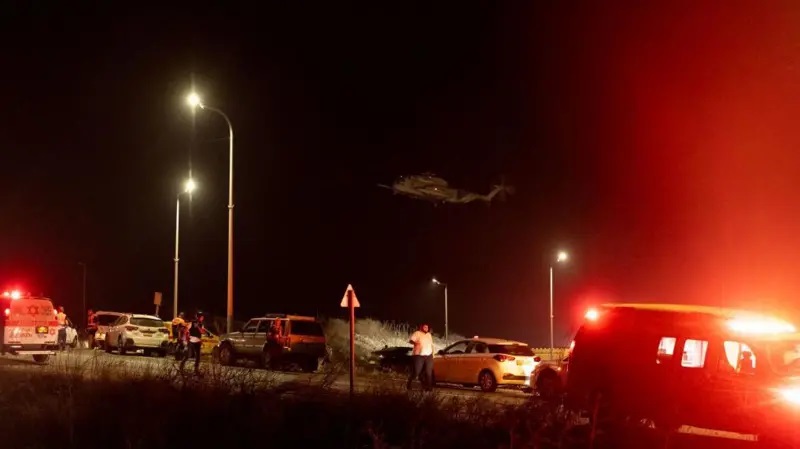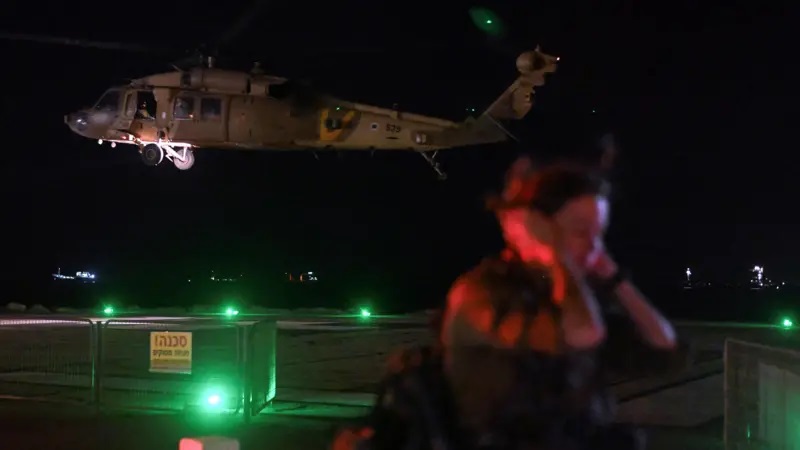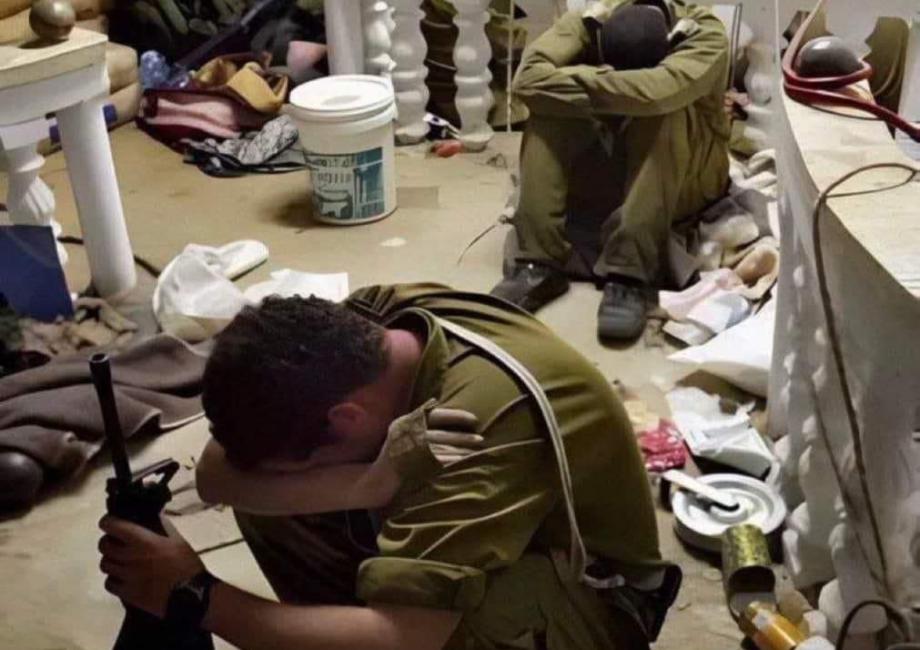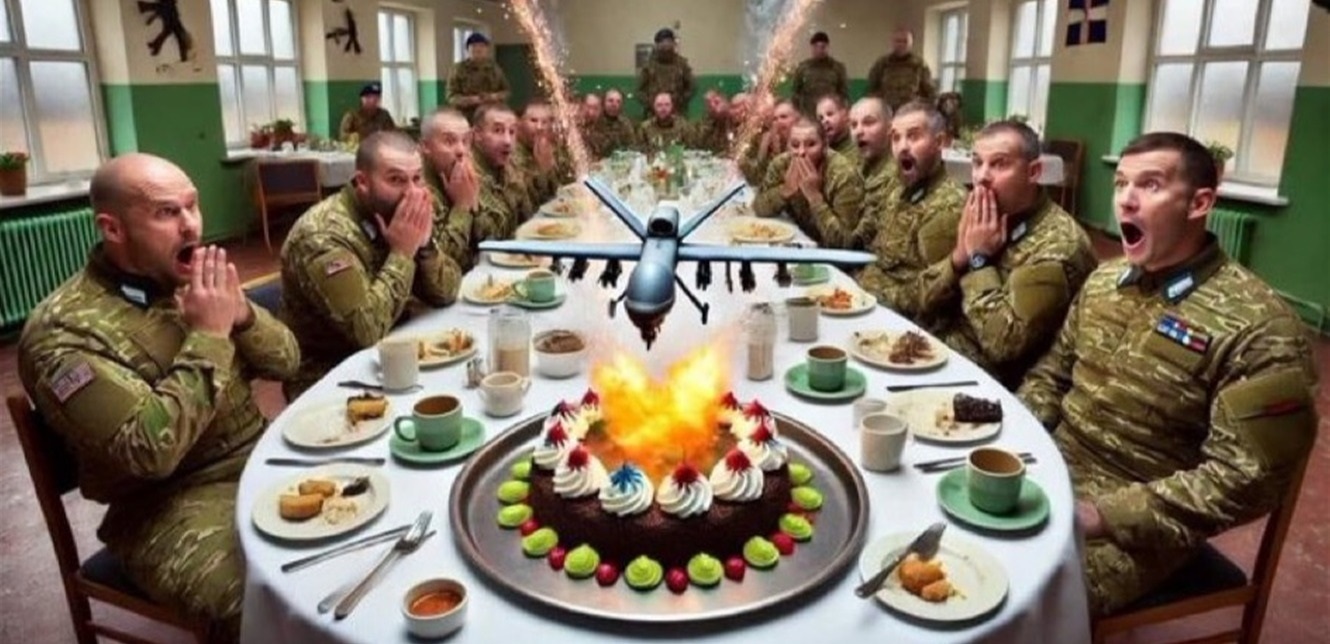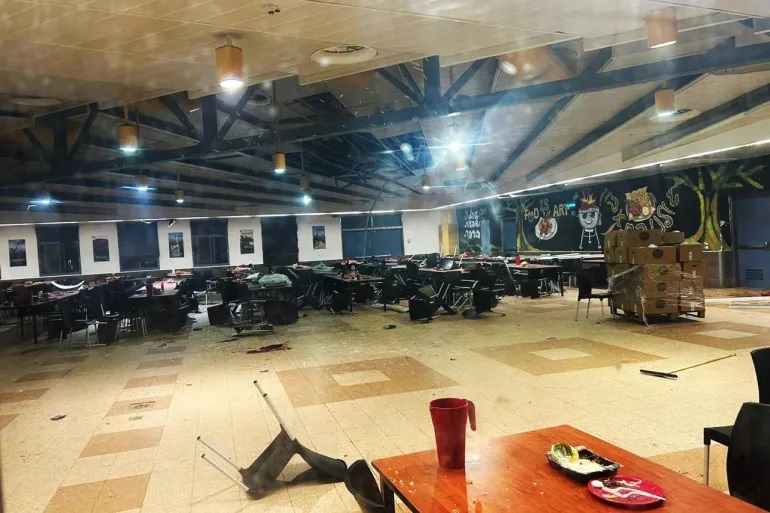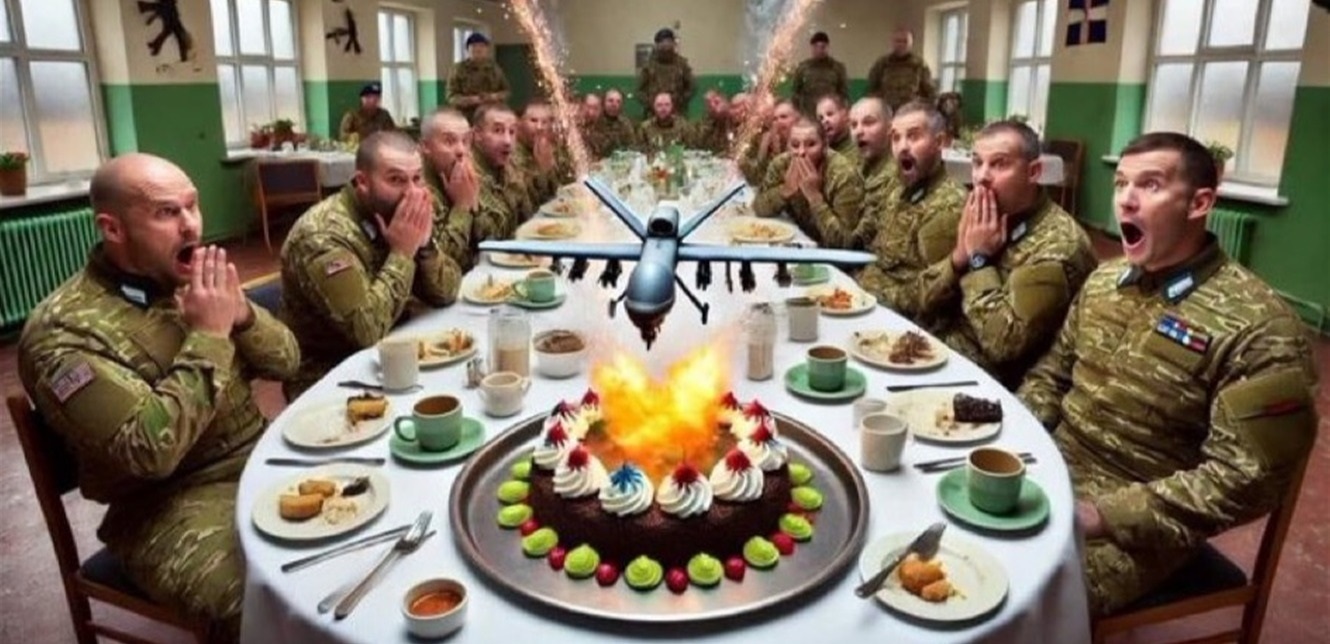
Sana'a-Saba:
Merzah Al-Asal
In an attack described by the Zionist enemy media as "the bloodiest" since the outbreak of the blessed "Al-Aqsa flood" battle. Hezbollah dealt a severe blow to the Zionist enemy army by targeting the training camp of the Golani Brigade, one of the most prominent elite brigades, with an advanced squadron of drones.
The operation, which came deep into the usurping entity south of Haifa, was not just a passing military attack, but rather established a new deterrence equation, and proved that the Lebanese resistance now possesses military and intelligence capabilities that put it in the position of initiating and controlling the course of the conflict.
This strategic strike, which shook the pillars of the Zionist military system, came to confirm that Hezbollah remains the active force that overturns the balance of power and reshapes the equations of deterrence in the region.
It seems that the attack was carried out by a squadron of advanced drones capable of bypassing enemy defenses and accurately reaching the target, in addition to the ability of these drones to infiltrate and direct strikes indicates that Hezbollah has developed new strategies that go beyond the traditional one, which puts it in a position of greater power in the face of the occupying entity.
By targeting the training camp of the Golani Zionist Brigade, one of the most important elite brigades in the Zionist enemy army, Hezbollah chose a target with high strategic symbolism, as this brigade plays a pivotal role in Zionist ground operations, especially in confrontations with the resistance.
This operation was not limited to indiscriminate targeting, but was a calculated attack directed at the heart of the Zionist military regime, and also carried a significant psychological impact on the enemy army and the Zionist community in general.
The targeting of the Golani Brigade, an elite unit of the enemy army, also carries a clear message that Hezbollah is capable of hitting the heart of the Zionist ground force and causing direct losses in its ranks, affecting the combat readiness of these forces in any future confrontation.
The targeting of training camps reinforces the insecurity within the usurping entity, as strikes are no longer limited to borders or nearby fronts but have reached sensitive military centers in-depth, and the choice of target in the Binyamina area confirms that Hezbollah has advanced intelligence capabilities to identify sites of military and security importance inside the depth.
The timing of the strike is also of great importance, as it comes in light of the escalation of Zionist aggression against Lebanon, especially the attacks that affected civilians in the southern suburbs.
The Golani Brigade is one of the strongest brigades in the Zionist enemy army. It is the only brigade that has continued military operations since its establishment, and it is of great importance to the leaders of the occupying entity, as it has become a spearhead.
But the brigade was dealt a severe blow on Sunday as his soldiers ate dinner in the dining hall of a training base near Binyamina, south of Haifa. According to activists on social media, the soldiers thought this dinner was like any other. Still, the surprise was that a march launched by Hezbollah penetrated the Zionist air defenses and fell amid the dining tables, making it the last dinner for four Zionist soldiers who were killed, in addition to wounding 67 others.
Social media users celebrated the operation launched by Hezbollah on the military base of the Golani Brigade in the city of Binyamina on Sunday.
Photos and videos began to spread from the site of the event, which tweeters described as the site of the largest painful operation that hit the occupation entity since the "Al-Aqsa Flood" battle launched by the Palestinian factions, led by the Izz al-Din al-Qassam Brigades, on the seventh of October 2023.
As the pictures spread from the Golani Brigade soldiers' dining hall, activists launched the hashtag #العشاء_الأخير and said that October 13, 2024, is the most injured day for the soldiers of the Zionist enemy army since October 7, 2023, as more than 100 Zionist soldiers were injured in ground battles and marches with the Lebanese resistance, and other numbers in ambushes of the resistance in the Gaza Strip.
Bloggers described the operation as complex and complex, after Hezbollah carried it out in the Zionist depth, and sent several messages through it, the first of which is that Hezbollah's organizational and military capabilities are much stronger than the enemy imagines. The second message, according to these bloggers, is that the air defense system and the Iron Dome system have proven to be fragile and vulnerable to Hezbollah's suicide marches, causing a crisis in the usurping entity.
Reactions within the Zionist entity to Hezbollah's attacks against the Golani Brigade camp continued after the success of a march belonging to the party on Sunday evening in penetrating an enemy army training base in the Binyamina area, south of Haifa, leaving dozens of dead and wounded, most of them in serious cases.
According to Awal Israel, former Zionist air defense chief Brig. Gen. Zveka Haimovich said Israel faces "complex possibilities and great challenges." "After the Hezbollah attack, all regional players recognized the potential and complex challenges that Israel faces in dealing with it, and we will see this challenge continue."
In turn, the newspaper commented on the attack, which commentators on social media described as "the last supper" after the success of the Lebanese Hezbollah in targeting the Golani Brigade, where the newspaper stated in its report, that the attack reflects "the continued failure of the Netanyahu government," and exposes the gaps of the Iron Dome in front of drones, which the newspaper's report described as "relatively cheap," in exchange for expensive modern technology.
Enemy Army Radio revealed that preliminary investigations about Hezbollah's attack against the Golani Brigade base show that the Zionist air defenses monitored the drone near Nahariya and the sirens were activated, but the air defenses lost the impact of the march after that, to succeed in reaching the dining hall in a camp belonging to the Golani Brigade and explode.
Israeli Defense Minister Yoav Gallant visited the scene of the attack on Monday morning and said during the troop inspection: "This is a difficult event with painful results. We must investigate it and study the details.
Media reports confirmed that Hezbollah succeeded in deceiving Zionist air defense systems by firing a barrage of missiles that provided coverage for the drones, allowing them to hit the target accurately. Two drones crept through the northern regions of the sea, and the navy was able to intercept a plane over Nahariya, while the second drone was unable to detect it.
The reports said that the target of the attack was the Zionist Chief of Staff, Herzi Halevy. However, he was not at the base at the time of the drone's fall and appeared the day after the attack from the site of the attack and addressed his soldiers.
Zionist circles described the attack as a difficult and dangerous event, while the enemy army opened an investigation to find out the reasons for the failure that led to this toll of deaths and injuries. The attack followed threats by Hezbollah in which the occupation vowed to bring quality weapons into the heart of the battle.
Military experts believe that the Binyamina attack is a "qualitative blow" by all standards and for several reasons, and that "the attack proved that no air defense system can detect and shoot down targets by one hundred percent, and in the world of weapons there are always surprises and unexpected things."
"We are at war, and an attack on a training base on the home front is difficult, and its consequences are painful," Halevi said, as he inspected the Golani brigade's training base in Binyamina, south of Haifa.
Enemy army spokesman Daniel Hagari said on Monday: "We will study and investigate the incident of a drone breaching the base without warning. The drone threat is the one we have faced since the beginning of the war, and we are required to provide better protection, we will investigate this incident, learn, and improve."
From the investigations conducted by the enemy army, it is clear that the drone broke through the ceiling of the dining room at the Golani base during dinner, without issuing an alarm, resulting in a large number of deaths and injuries.
Websites posted pictures of dozens of Israeli soldiers helping to evacuate the wounded, amid questions about how they could reach the targeted place so quickly in an uninhabited area between Binyamina and Wadi Ara.
It is noteworthy that the march, a type (Sayyad 107), broke through the dining hall of the soldiers of the "Golani" brigade as they ate their dinner inside a military training base inside the settlement of Binyamina, which is located on the lands of the village of Shouna, which has been displaced since the Nakba of 1948.
According to eyewitnesses, the march had fired a missile before it swooped down by suicide on the base, but the enemy army denies this, and says, in its statement: That the defense systems monitored two drones from Lebanon and shot down the navy, while the second succeeded in evading south until it exploded at the base of Binyamina.
In any case, military experts in the enemy entity believe that the defense systems cannot fully confront the threat of drones, because they are small in size, they can move flexibly and change course sharply in one second, in addition to flying at a low altitude, which enables them to evade monitoring and detection systems.
The painful blow seems to be the most painful for the usurping entity since the outbreak of the war, especially as it affects the Golani Brigade, one of the oldest and most important components of the Zionist ground weapon, since 1948, and that it followed operations during the day yesterday that injured 28 soldiers.
Under the headline "Endless War," Amos Harel, a senior military analyst at the Zionist newspaper Haaretz, warns that Hezbollah's fire system is waking up, firing hundreds of rockets a day into the north.
He went on to warn him of the unknown. "In the south (Gaza) the army is advancing without much resistance at the moment, and at first glance, these are conditions capable of enabling Israel to seek a political settlement and try to end the war in the north within weeks, but I doubt that this will happen on the ground," he said.
Harel had already warned, a year ago, that the war would escalate, be prolonged, and involve great danger, as it is without a strategic vision, without a political vision, and because the calculations of decision-makers, led by Netanyahu, are mixed. Now it is clear that the threat in the north was more severe and greater than in the south.
E.M
Merzah Al-Asal
In an attack described by the Zionist enemy media as "the bloodiest" since the outbreak of the blessed "Al-Aqsa flood" battle. Hezbollah dealt a severe blow to the Zionist enemy army by targeting the training camp of the Golani Brigade, one of the most prominent elite brigades, with an advanced squadron of drones.
The operation, which came deep into the usurping entity south of Haifa, was not just a passing military attack, but rather established a new deterrence equation, and proved that the Lebanese resistance now possesses military and intelligence capabilities that put it in the position of initiating and controlling the course of the conflict.
This strategic strike, which shook the pillars of the Zionist military system, came to confirm that Hezbollah remains the active force that overturns the balance of power and reshapes the equations of deterrence in the region.
It seems that the attack was carried out by a squadron of advanced drones capable of bypassing enemy defenses and accurately reaching the target, in addition to the ability of these drones to infiltrate and direct strikes indicates that Hezbollah has developed new strategies that go beyond the traditional one, which puts it in a position of greater power in the face of the occupying entity.
By targeting the training camp of the Golani Zionist Brigade, one of the most important elite brigades in the Zionist enemy army, Hezbollah chose a target with high strategic symbolism, as this brigade plays a pivotal role in Zionist ground operations, especially in confrontations with the resistance.
This operation was not limited to indiscriminate targeting, but was a calculated attack directed at the heart of the Zionist military regime, and also carried a significant psychological impact on the enemy army and the Zionist community in general.
The targeting of the Golani Brigade, an elite unit of the enemy army, also carries a clear message that Hezbollah is capable of hitting the heart of the Zionist ground force and causing direct losses in its ranks, affecting the combat readiness of these forces in any future confrontation.
The targeting of training camps reinforces the insecurity within the usurping entity, as strikes are no longer limited to borders or nearby fronts but have reached sensitive military centers in-depth, and the choice of target in the Binyamina area confirms that Hezbollah has advanced intelligence capabilities to identify sites of military and security importance inside the depth.
The timing of the strike is also of great importance, as it comes in light of the escalation of Zionist aggression against Lebanon, especially the attacks that affected civilians in the southern suburbs.
The Golani Brigade is one of the strongest brigades in the Zionist enemy army. It is the only brigade that has continued military operations since its establishment, and it is of great importance to the leaders of the occupying entity, as it has become a spearhead.
But the brigade was dealt a severe blow on Sunday as his soldiers ate dinner in the dining hall of a training base near Binyamina, south of Haifa. According to activists on social media, the soldiers thought this dinner was like any other. Still, the surprise was that a march launched by Hezbollah penetrated the Zionist air defenses and fell amid the dining tables, making it the last dinner for four Zionist soldiers who were killed, in addition to wounding 67 others.
Social media users celebrated the operation launched by Hezbollah on the military base of the Golani Brigade in the city of Binyamina on Sunday.
Photos and videos began to spread from the site of the event, which tweeters described as the site of the largest painful operation that hit the occupation entity since the "Al-Aqsa Flood" battle launched by the Palestinian factions, led by the Izz al-Din al-Qassam Brigades, on the seventh of October 2023.
As the pictures spread from the Golani Brigade soldiers' dining hall, activists launched the hashtag #العشاء_الأخير and said that October 13, 2024, is the most injured day for the soldiers of the Zionist enemy army since October 7, 2023, as more than 100 Zionist soldiers were injured in ground battles and marches with the Lebanese resistance, and other numbers in ambushes of the resistance in the Gaza Strip.
Bloggers described the operation as complex and complex, after Hezbollah carried it out in the Zionist depth, and sent several messages through it, the first of which is that Hezbollah's organizational and military capabilities are much stronger than the enemy imagines. The second message, according to these bloggers, is that the air defense system and the Iron Dome system have proven to be fragile and vulnerable to Hezbollah's suicide marches, causing a crisis in the usurping entity.
Reactions within the Zionist entity to Hezbollah's attacks against the Golani Brigade camp continued after the success of a march belonging to the party on Sunday evening in penetrating an enemy army training base in the Binyamina area, south of Haifa, leaving dozens of dead and wounded, most of them in serious cases.
According to Awal Israel, former Zionist air defense chief Brig. Gen. Zveka Haimovich said Israel faces "complex possibilities and great challenges." "After the Hezbollah attack, all regional players recognized the potential and complex challenges that Israel faces in dealing with it, and we will see this challenge continue."
In turn, the newspaper commented on the attack, which commentators on social media described as "the last supper" after the success of the Lebanese Hezbollah in targeting the Golani Brigade, where the newspaper stated in its report, that the attack reflects "the continued failure of the Netanyahu government," and exposes the gaps of the Iron Dome in front of drones, which the newspaper's report described as "relatively cheap," in exchange for expensive modern technology.
Enemy Army Radio revealed that preliminary investigations about Hezbollah's attack against the Golani Brigade base show that the Zionist air defenses monitored the drone near Nahariya and the sirens were activated, but the air defenses lost the impact of the march after that, to succeed in reaching the dining hall in a camp belonging to the Golani Brigade and explode.
Israeli Defense Minister Yoav Gallant visited the scene of the attack on Monday morning and said during the troop inspection: "This is a difficult event with painful results. We must investigate it and study the details.
Media reports confirmed that Hezbollah succeeded in deceiving Zionist air defense systems by firing a barrage of missiles that provided coverage for the drones, allowing them to hit the target accurately. Two drones crept through the northern regions of the sea, and the navy was able to intercept a plane over Nahariya, while the second drone was unable to detect it.
The reports said that the target of the attack was the Zionist Chief of Staff, Herzi Halevy. However, he was not at the base at the time of the drone's fall and appeared the day after the attack from the site of the attack and addressed his soldiers.
Zionist circles described the attack as a difficult and dangerous event, while the enemy army opened an investigation to find out the reasons for the failure that led to this toll of deaths and injuries. The attack followed threats by Hezbollah in which the occupation vowed to bring quality weapons into the heart of the battle.
Military experts believe that the Binyamina attack is a "qualitative blow" by all standards and for several reasons, and that "the attack proved that no air defense system can detect and shoot down targets by one hundred percent, and in the world of weapons there are always surprises and unexpected things."
"We are at war, and an attack on a training base on the home front is difficult, and its consequences are painful," Halevi said, as he inspected the Golani brigade's training base in Binyamina, south of Haifa.
Enemy army spokesman Daniel Hagari said on Monday: "We will study and investigate the incident of a drone breaching the base without warning. The drone threat is the one we have faced since the beginning of the war, and we are required to provide better protection, we will investigate this incident, learn, and improve."
From the investigations conducted by the enemy army, it is clear that the drone broke through the ceiling of the dining room at the Golani base during dinner, without issuing an alarm, resulting in a large number of deaths and injuries.
Websites posted pictures of dozens of Israeli soldiers helping to evacuate the wounded, amid questions about how they could reach the targeted place so quickly in an uninhabited area between Binyamina and Wadi Ara.
It is noteworthy that the march, a type (Sayyad 107), broke through the dining hall of the soldiers of the "Golani" brigade as they ate their dinner inside a military training base inside the settlement of Binyamina, which is located on the lands of the village of Shouna, which has been displaced since the Nakba of 1948.
According to eyewitnesses, the march had fired a missile before it swooped down by suicide on the base, but the enemy army denies this, and says, in its statement: That the defense systems monitored two drones from Lebanon and shot down the navy, while the second succeeded in evading south until it exploded at the base of Binyamina.
In any case, military experts in the enemy entity believe that the defense systems cannot fully confront the threat of drones, because they are small in size, they can move flexibly and change course sharply in one second, in addition to flying at a low altitude, which enables them to evade monitoring and detection systems.
The painful blow seems to be the most painful for the usurping entity since the outbreak of the war, especially as it affects the Golani Brigade, one of the oldest and most important components of the Zionist ground weapon, since 1948, and that it followed operations during the day yesterday that injured 28 soldiers.
Under the headline "Endless War," Amos Harel, a senior military analyst at the Zionist newspaper Haaretz, warns that Hezbollah's fire system is waking up, firing hundreds of rockets a day into the north.
He went on to warn him of the unknown. "In the south (Gaza) the army is advancing without much resistance at the moment, and at first glance, these are conditions capable of enabling Israel to seek a political settlement and try to end the war in the north within weeks, but I doubt that this will happen on the ground," he said.
Harel had already warned, a year ago, that the war would escalate, be prolonged, and involve great danger, as it is without a strategic vision, without a political vision, and because the calculations of decision-makers, led by Netanyahu, are mixed. Now it is clear that the threat in the north was more severe and greater than in the south.
E.M
